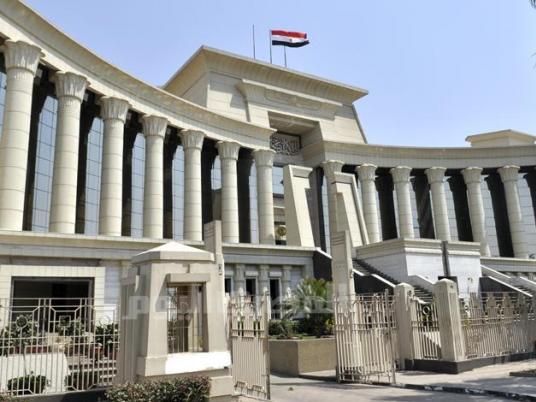
The Administrative Court in Cairo referred the law regulating the Constituent Assembly to the Supreme Constitutional Court Tuesday, a decision that gives the Islamist-dominated assembly more time to draft the first constitution after the fall of former President Hosni Mubarak.
The Freedom and Justice Party described the decision as an opportunity to begin a national dialogue with various political and social sects over the anticipated constitution.
In a statement on Tuesday, the FJP said the ruling represents “a new meeting point for all social groups to write a constitution that represents Egypt.”
The party said it renews its call for all political and social forces to give their suggestions on the document to the assembly.
Muslim Brotherhood lawyer Abdel Moneim Abdel Maqsoud described the Administrative Court's decision as "positive," saying it used its judicial powers properly and that the move will enable the assembly to finish its work and introduce the constitution to the people.
He added that the Supreme Constitutional Court needs at least two months to rule on the case, citing the law that obliges it to consider the cases 45 days after its referral.
The court was overseeing 48 lawsuits demanding the dissolution of the Constituent Assembly. Plaintiffs claim the assembly fails to proportionately represent various social sectors, and violates the interim constitution by including MPs as members.
Despite Abdel Maqsoud's statements, the move could further stoke tensions between Islamists and the constitutional court, given the tensions between both sides stemming from the court's decision in June to dissolve the Islamist-dominated People's Assembly.
The Administrative Court referred Law 79/2012, which granted the assembly immunity from dissolution, to the Supreme Constitutional Court, which will rule on the law based on the Constitutional Declaration that has governed the country since the fall of former President Hosni Mubarak.
The People's Assembly had approved the law on the same day of its formation two days before Parliament was dissolved. However, the Supreme Council of the Armed Forces refused to pass the law.
After decreeing the return of the People's Assembly, President Mohamed Morsy approved the stalled law to prevent the dissolution of the Constituent Assembly.
Legal officials from the Muslim Brotherhood’s Freedom and Justice Party leaned heavily on the law during their pleadings to protect the work of the Constituent Assembly.
Plaintiffs against the Constituent argued that the manner in which the body was formed was illegal. Many of them were opposed to the heavy Islamist representation among assembly members.
Members of the Constituent Assembly expressed hope that today's decision and future court rulings would leave the body intact. Assembly member Maged Shebeita said that the decision will give the assembly more time to finish a constitutional draft.
"This amount of time is sufficient to complete writing the constitution and submit it to Morsy, particularly since the assembly's mission ends on 12 December," Shebeita said.
Assembly spokesperson Waheed Abdel Meguid said the major challenge facing the assembly is not external threats but rather the differences among its own members on certain articles that constitute the pillars of the constitution.
Abdel Maguid added that with its decision, the Administrative Court has adopted the opinion which states that the law governing the formation of the assembly is legally correct, referring the legal problem to the Supreme Constitutional Court.
Meanwhile, leading Wasat Party figure and Constituent Assembly member Essam Sultan said the court's decision makes the assembly safe from "lurking and encroachments by those who do not believe in the separation of powers, even if the constitutional court declares the law unconstitutional."
Writing on his Facebook page, Sultan said that the decision is a victory for the Constituent Assembly, while it poses a dilemma for SCC.
The Supreme Constitutional Court last week rejected its status in the first draft of the new constitution, with court president Maher al-Beheiry labeled the articles pertaining to the court’s status "a step backwards and a flagrant intervention in the court's affairs."
But the court later said it had agreed upon amending the articles with the Constituent Assembly.
Sultan has prominently criticized what he calls "the politicized role of the court,” referring to its decision to dissolve Parliament in June.
“Some of [the SCC's] judges, led by Tahani al-Gebali, had given their opinion on the case openly, even before it was referred to them. This makes it improper for the Supreme Constitutional Court to decide on the law. The expected declaration of unconstitutionality will, however, be focused on the law issued by the People’s Assembly, rather than the Constituent Assembly that had been elected according to citizen will,” Sultan wrote.




